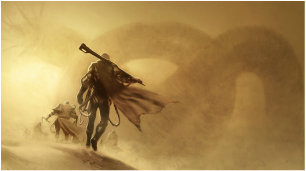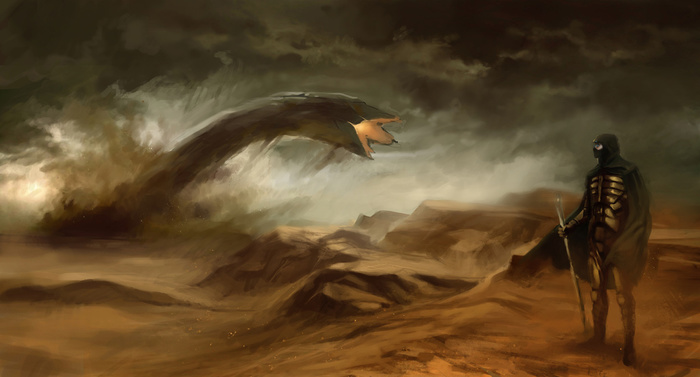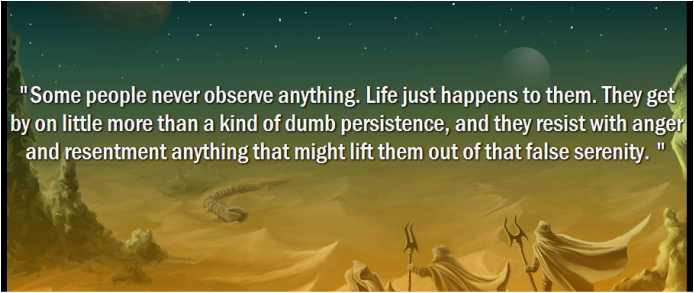"Why do you test for humans?" he asked.
"To set you free."
"Free?"
"Once men turned their thinking over to machines in the hope that this would set them free. But that only permitted other men with machines to enslave them."
"To set you free."
"Free?"
"Once men turned their thinking over to machines in the hope that this would set them free. But that only permitted other men with machines to enslave them."
 Artwork by Henrik Sahlstrom
Artwork by Henrik Sahlstrom There's much of great value that can be taken away from Frank Herbert's legendary work, "Dune". Politics, philosophy, warfare, governance, ecology, sacrifice, and the value of combined intelligence, strength, and spirit that makes a great leader - as well as a follower - are some of the larger ideas that form Dune. Amongst its content, one can get an almost personal feeling of the responsibilities of tribal politics, and the philosophical lessons of personal amelioration.
I won't be going into details of this all. Instead, I would strongly recommend reading the book itself. However, I would like to talk about a few ideas this book puts forth regarding the affairs of politics, self-edification, and how it can be related to the current state-of-affairs in which the European peoples and their nations presently find themselves in - and how it will help deliver them from it.
Within the first chapters, Paul Atreides finds himself in the presence of the Bene Gesserit Reverend Mother Gaius Helen Mohiam, where she tests Paul to see whether he's human. Humans are those who can control and think for themselves, and continue to learn at all times - opposed to people, who cannot think nor reason on their own and operate on a more instinctual basis, requiring their reality to be dictated to them, and are unable to see it for what it is. The test requires Paul to put his hand in a metallic box - if he removes it he will die. Immense pain emanates from Paul's right hand - and though he cannot see it, everything tells him once the test it over, he will remove his hand to see a blackened and burnt stump. During this test, this Bene Gesserit rite-of-passage, Paul recites from the Litany against Fear:
"I must not fear. Fear is the mind-killer. Fear is the little-death that brings total obliteration. I will face my fear. I will permit it to pass over me and through me. And when it has gone past I will turn the inner eye to see its path. Where the fear has gone there will be nothing. Only I will remain."
If Paul Atreides were to have failed this test, it would have meant his death. However, by overcoming the fear of the unknown and controlling his instinctual impulse to respond to pain, he passed completely unharmed. This Litany against Fear is an example of the great philosophical lessons we can learn from Dune, and harkens something familiar of other great Greek and Roman philosophers, such as Socrates and Marcus Aurelius. Fear exists only in our mind, and once it is given our permission to enter, will immobilize and destroy us. I believe this fear is a large reason why those European peoples who are wise to the world's goings-on do not speak out against it; fear of losing their jobs with which they support themselves and their family, and for fear of losing friends, family, or quality-of-life. Our enemy knows we're afraid to act, and we must realize that the possible repercussions of speaking the Truth, and acting on that Truth, are something less to fear than the certain consequences of our inaction!
This is a lesson that our people are starting to relearn, however. Paul, later known as Muad'Dib, is quoted, "There should be a science of discontent. People need hard times and oppression to develop psychic muscles." Europeans and their nations world-wide have been experiencing a steady decline of their race, culture, and way-of-life. Those that passively accept it seek solace in ignorance, and those that embrace and cheer for our destruction have sought serenity in their own arrogance - but nature doesn't reward ignorance, and it punishes arrogance. Those stalwart Europeans who have come to know the truth have had to develop their mind, seeking information and testing the facts to see reality for what it is. And this becomes evident when observing humans that have the mental faculties to think for themselves in contrast to the people who turned their thinking over to machines, as The Reverend Mother had previously mentioned.
Paul, after passing the test, wonders the purpose of it. The Reverend Mother responds:
"Ever sift sand through a screen?" she asked.
The tangential slash of her question shocked his mind into a higher awareness: Sand through a screen. He nodded.
"We Bene Gesserit sift people to find the humans."
The purpose of the test is to see if one is of worth; one who has control and direction over their own mind and body - a human.
The test itself is one of "crisis and observation" - maintaining composure during a crisis instead of acting on instinct to remove oneself from the pain or danger, and instead observing it and seeing it for what it is, and then moving forward with a rational mind. Essentially, it's the self-imposed delay between desire and acting on that desire.
Likewise, it is our responsibility to sift through the sands of 'people' we meet each day, looking for potential 'humans' and testing them - making them aware of the crisis, have them observe, and see how they react.
In a real-life scenario, I have been introducing others to the crisis (international jewry and its symptoms such as White genocide, cultural Marxism, and the like) in small increments, giving them the tools to observe the crisis (articles, books, and other material), and seeing how they react. While half are completely disinterested, some are interested but remain passive, as they admit it frightens them too much. However, some react by wanting to know more and to do something about it. As of late, I've been having more success in this process - however, I believe much of that success is thanks to the current U.S. presidential race and the global political-climate.
Waking up our folk isn't an easy task. In fact, it can seem as difficult as crossing a minefield. You're thankful for each step that lands safely on solid ground and takes you forward, but one wrong step can lead you to trouble in the form of economic or social disenfranchisement. However, the enemy's at our back and our only way is forward, be it dangerous or not.
I won't be going into details of this all. Instead, I would strongly recommend reading the book itself. However, I would like to talk about a few ideas this book puts forth regarding the affairs of politics, self-edification, and how it can be related to the current state-of-affairs in which the European peoples and their nations presently find themselves in - and how it will help deliver them from it.
Within the first chapters, Paul Atreides finds himself in the presence of the Bene Gesserit Reverend Mother Gaius Helen Mohiam, where she tests Paul to see whether he's human. Humans are those who can control and think for themselves, and continue to learn at all times - opposed to people, who cannot think nor reason on their own and operate on a more instinctual basis, requiring their reality to be dictated to them, and are unable to see it for what it is. The test requires Paul to put his hand in a metallic box - if he removes it he will die. Immense pain emanates from Paul's right hand - and though he cannot see it, everything tells him once the test it over, he will remove his hand to see a blackened and burnt stump. During this test, this Bene Gesserit rite-of-passage, Paul recites from the Litany against Fear:
"I must not fear. Fear is the mind-killer. Fear is the little-death that brings total obliteration. I will face my fear. I will permit it to pass over me and through me. And when it has gone past I will turn the inner eye to see its path. Where the fear has gone there will be nothing. Only I will remain."
If Paul Atreides were to have failed this test, it would have meant his death. However, by overcoming the fear of the unknown and controlling his instinctual impulse to respond to pain, he passed completely unharmed. This Litany against Fear is an example of the great philosophical lessons we can learn from Dune, and harkens something familiar of other great Greek and Roman philosophers, such as Socrates and Marcus Aurelius. Fear exists only in our mind, and once it is given our permission to enter, will immobilize and destroy us. I believe this fear is a large reason why those European peoples who are wise to the world's goings-on do not speak out against it; fear of losing their jobs with which they support themselves and their family, and for fear of losing friends, family, or quality-of-life. Our enemy knows we're afraid to act, and we must realize that the possible repercussions of speaking the Truth, and acting on that Truth, are something less to fear than the certain consequences of our inaction!
This is a lesson that our people are starting to relearn, however. Paul, later known as Muad'Dib, is quoted, "There should be a science of discontent. People need hard times and oppression to develop psychic muscles." Europeans and their nations world-wide have been experiencing a steady decline of their race, culture, and way-of-life. Those that passively accept it seek solace in ignorance, and those that embrace and cheer for our destruction have sought serenity in their own arrogance - but nature doesn't reward ignorance, and it punishes arrogance. Those stalwart Europeans who have come to know the truth have had to develop their mind, seeking information and testing the facts to see reality for what it is. And this becomes evident when observing humans that have the mental faculties to think for themselves in contrast to the people who turned their thinking over to machines, as The Reverend Mother had previously mentioned.
Paul, after passing the test, wonders the purpose of it. The Reverend Mother responds:
"Ever sift sand through a screen?" she asked.
The tangential slash of her question shocked his mind into a higher awareness: Sand through a screen. He nodded.
"We Bene Gesserit sift people to find the humans."
The purpose of the test is to see if one is of worth; one who has control and direction over their own mind and body - a human.
The test itself is one of "crisis and observation" - maintaining composure during a crisis instead of acting on instinct to remove oneself from the pain or danger, and instead observing it and seeing it for what it is, and then moving forward with a rational mind. Essentially, it's the self-imposed delay between desire and acting on that desire.
Likewise, it is our responsibility to sift through the sands of 'people' we meet each day, looking for potential 'humans' and testing them - making them aware of the crisis, have them observe, and see how they react.
In a real-life scenario, I have been introducing others to the crisis (international jewry and its symptoms such as White genocide, cultural Marxism, and the like) in small increments, giving them the tools to observe the crisis (articles, books, and other material), and seeing how they react. While half are completely disinterested, some are interested but remain passive, as they admit it frightens them too much. However, some react by wanting to know more and to do something about it. As of late, I've been having more success in this process - however, I believe much of that success is thanks to the current U.S. presidential race and the global political-climate.
Waking up our folk isn't an easy task. In fact, it can seem as difficult as crossing a minefield. You're thankful for each step that lands safely on solid ground and takes you forward, but one wrong step can lead you to trouble in the form of economic or social disenfranchisement. However, the enemy's at our back and our only way is forward, be it dangerous or not.
Paul's mother, The Lady Jessica, mentions in the early chapters of Dune that, for a time, she's meeting resistance within herself and she quotes, “The mind commands the body and it obeys. The mind orders itself and meets resistance.” I believe we've all encountered this predicament at one time or another. Even knowing what we know, and knowing what we need to do, we fail to act due to the fear we allow to dwell within us.
It's time to set aside the fear and act. Pass out leaflets or post stickers; mention the topics when appropriate during conversation; don't be afraid to counter the cultural Marxist narrative when someone's parroting its ideology; use whatever means you have to make our folk aware. Time is running out, and it's not going to become any easier to start acting for our interests.
It's time to set aside the fear and act. Pass out leaflets or post stickers; mention the topics when appropriate during conversation; don't be afraid to counter the cultural Marxist narrative when someone's parroting its ideology; use whatever means you have to make our folk aware. Time is running out, and it's not going to become any easier to start acting for our interests.


